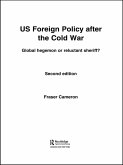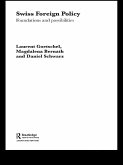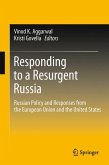Closely examining US foreign policy, past and present, David Sylvan and Stephen Majeski draw on a wealth of historical and contemporary cases to show how the US has had a 'client state' empire for at least a century. They clearly illustrate how much of American policy revolves around acquiring clients, maintaining clients and engaging in hostile policies against enemies deemed to threaten them, representing a peculiarly American form of imperialism. They also reveal how clientilism informs apparently disparate activities in different geographical regions and operates via a specific range of policy instruments, showing predictable variation in the use of these instruments.
With a broad range of cases from US policy in the Caribbean and Central America after the Spanish-American War, to the origins of the Marshall Plan and NATO, to economic bailouts and covert operations, and to military interventions in South Vietnam, Kosovo and Iraq, this important book will be of great interest to students and researchers of US foreign policy, security studies, history and international relations.
This book has a dedicated website at: www.us-foreign-policy-prespective.org featuring additional case studies and data sets.
Dieser Download kann aus rechtlichen Gründen nur mit Rechnungsadresse in A, B, BG, CY, CZ, D, DK, EW, E, FIN, F, GR, HR, H, IRL, I, LT, L, LR, M, NL, PL, P, R, S, SLO, SK ausgeliefert werden.
Charles W. Kegley, Distinguished Pearce Professor of International Relations Emeritus at the University of South Carolina, USA; Vice Chair of the Carnegie Council for Ethics in International Affairs, and President of the International Studies Association 1993-1994
"In this lucid, erudite, penetrating book, David Sylvan and Stephen Majeski turn standard analyses of U.S. foreign policy upside down. The tale they tell is one of means shaping ends, of instruments driving policies, of bureaucracies creating rather than serving national interests. Sylvan and Majeski's cybernetic account of U.S. foreign policy is shockingly compelling - conceptually sound and empirically rich. This book is a must-read for any serious student of U.S. foreign policy."
David A. Welch, Professor of Political Science, Director, Trudeau Centre for Peace and Conflict Studies, University of Toronto, Canada
"Sylvan and Majeski flip a Gestalt switch to illuminate the continuity of US foreign policy. They consider it the product not of some conjectured grand strategy, but of the policy instruments available to policymakers. By examining US foreign policy from its actual means, not its putative ends, Sylvan and Majeski produce a fresh and compelling account that amounts to a more nuanced understanding of the inner workings of imperial politics after colonialism."
Gavan Duffy, Syracuse University, USA









